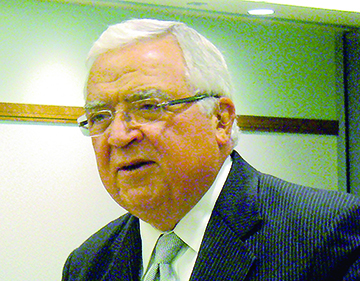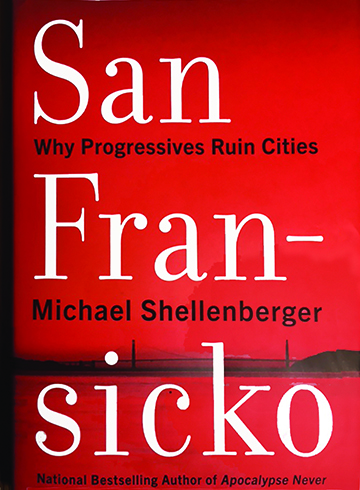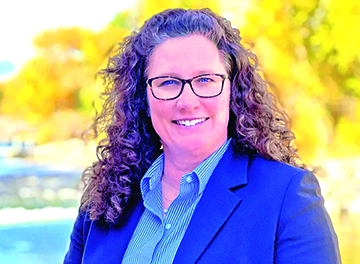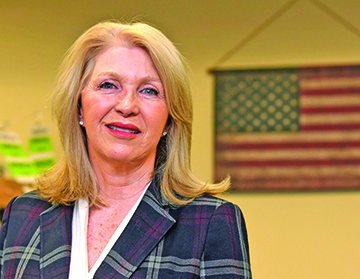
by Charles Bonniwell | Apr 21, 2022 | Editorials

Citizen Kane
When John L. Kane first donned the black robes of a federal court district court judge and climbed the steps of the judicial pulpit in 1977, most Colorado residents had not even been born. He was appointed by President Jimmy Carter who became known for idiosyncratic judicial picks. Eight years ago, this Editorial Board praised Judge Kane over him taking to task the Denver City Attorney’s Office over the torture case of Jamal Hunter in the city jail. He had been compared to film hero Sheriff Will Kane in the western High Noon. While Will Kane knew when to retire, apparently Judge John Kane does not. The octogenarian jurist is being compared more these days with another film protagonist, the megalomanic John Foster Kane in the film Citizen Kane.
Federal judges have, according to the U.S. Constitution, a lifetime tenure which some judges such as Ruth Bader Ginsburg took literally. It appears octogenarian Judge Kane appears to take a similar view to Justice Ginsburg for his position as a District of Colorado federal judge much to the detriment of the people Colorado. His judgement and acuity appear substantially diminished over the years and it’s getting worse. In the fall of last year, he issued an injunction stopping parents in Douglas County from exempting their children from wearing masks in public schools. The public officials and people of Douglas County had spent months fighting to free themselves from the dictatorial mandates of Tri-County Health and its somewhat crazed executive director Dr. John Douglas who singlehandedly destroyed the oldest and largest health department in the state with his mask mandates.
In September of last year, the duly elected Douglas County commissioners voted to finally be freed of Tri-County and set up its own Douglas County Health Department. The new health department issued a ruling allowing a parent or guardian to sign a written declaration exempting their children from school mask mandates.
Free at last, free at last! The children who have the least risk from COVID-19 were liberated from mask oppression at least with the consent of their parents. But while Douglas County was liberated from the malicious hands of Dr. Douglas they were unfortunately delivered into the hands of germaphobe Judge Kane. The School District with teacher union board members and nine students claimed the health department could not make health decisions for the county; that was up to an 84-year-old federal judge. He issued a highly quixotic ruling claiming under the Americans with Disabilities Act children must be masked. Once the governor declared the COVID-19 pandemic to be over it mooted the bizarre ruling but in theory Judge Kane could become his own health department.
What was pathetic about the ruling was Judge Kane’s apparent inability to even understand the federal courts’ own declarations about mask requirements. A statewide declaration had been issued saying those entering federal courtrooms in Colorado could, but were not required to wear masks, except in high COVID areas of the state. While Grand Junction was considered a high-risk, Denver was not. Directives posted on the courtroom doors of federal judges in Denver, other than Kane, correctly indicated that masks could be worn but were not required. On Kane’s courtroom door, it announced masks must be worn. A judge who cannot read and understand orders on masks probably should not be issuing mask mandates.
Kane’s most recent outrage, and there are many others, was his ruling on the effort of five Republican plaintiffs not to have their nominating process overwhelmed by unaffiliated voters who do not share their political beliefs. Kathryn Murdoch and various other Democrats has been pouring money into Colorado Republican primaries to elect ever more left leading Republicans.

“Rosebud”
In theory, in federal court the judge assigned to your case is random so that plaintiffs cannot forum shop. Whether federal judges can try to get certain cases assigned to them is less clear. The plaintiffs in the open primary challenge case were assigned to President George W. Bush appointee Chief Judge Philip A. Brimmer, considered a favorable draw. But then all of a sudden, Brimmer had a conflicting criminal trial and “abracadabra,” up pops Carter appointee Judge Kane who was generally considered the worst pick the plaintiffs could have gotten.
The Colorado Secretary of State Jena Griswold through the attorney general’s office filed a motion to dismiss for “lack of standing” of the plaintiffs because the Republican Party itself was not a party.
Normally a motion to dismiss for lack of standing is considered first as if granted everything else is moot. The plaintiffs had to know that Kane was itching to get them when he combined the motion to dismiss with the request for a temporary preliminary injunction on what appeared to be specious grounds. It was obvious that Judge Kane wanted to get his pound of flesh from plaintiffs’ attorney Dr. John Eastman, a bete noire to Democrats like Kane for advising Trump and speaking on January 6th at the Capitol.
Kane’s 32-page Memorandum and Order was every bit as biased as expected. On the dozens of issues, law, and fact, Kane found every one in favor of Jena Griswold and then some. It was so one-sided that a 710 KNUS radio personality leeringly read out parts of the opinion on his morning radio show (replacing Peter Boyles) various parts of opinions calling it a “b**** slap” to the plaintiffs and their counsel.
When a radio jock finds your legal opinion so biased as to be entertaining, it’s probably time to retire as a judge. Unfortunately, Judge John Kane appears to enjoy pushing Coloradans around so much they will get to carry him off the bench only after expiring and whispering “Rosebud.”
— Editorial Board

by Glendale Sports Center | Apr 21, 2022 | Glendale City News
by Amanda-Scates Preisinger, MPH
Senior Director of Health and Well-Being, YMCA of Metro Denver

Mental health is how we think, feel, and act. Throughout our lives, our mental health is influenced by the environments around us. When these environments are stressful, we try to cope — sometimes in ways that help and sometimes in ways that harm.
Over the past two years, we have all had to live in stressful environments with COVID-19 and social isolation. The impact on our youth has been particularly staggering with a recent CDC-published study indicating that more than 1 in 3 high school students experienced poor mental health during the pandemic. Now more than ever, we all need a safe and healthy environment that supports our mental health, an environment where the community spends time together, has fun and feels connected to one another.
We at the YMCA of Metro Denver are committed to providing that welcoming and transformative home away from home that we all need right now. As we recognize Mental Health Awareness Month, your local Y is offering a number of workshops and experiences to promote mental health in our community. From mindful yoga and stress management to wellness seminars and fly fishing, there are opportunities for everyone to care for their spirit, mind, and body. Our team members are committed to supporting the mental health of every person we connect with.
While our role at the Y is centered around community care through supportive relationships, positive skill building, and empowerment, we also recognize that we all have different needs when it comes to mental health. By partnering with non-profit organizations and government agencies across the Denver Metro, we at the Y are working to ensure that we can connect anyone with the programming, resources, and support they need.
We know that mental health is a continuum, and our aim is that our programs and services help the community cope with stress, be productive, and contribute in a meaningful way to their families, workplaces, and communities. When adults are healthy, motivated, and socially connected, they contribute to stronger communities. When we support the mental health of youth, they have a greater ability to overcome obstacles, develop fulfilling relationships, adapt to change, and realize their potential.
When we promote the mental health and wellness of each other, that creates a safer and healthier community for us all.
To learn more about our mental health workshops, events and resources at the Y, please visit denverymca.org/mentalhealth.

by Regan Bervar | Mar 18, 2022 | General Featured
“Progressives want livable, walkable cities, but by allowing the continued operation of open-air drug scenes, they are making cities unlivable and unwalkable, as well as inhumane.”
 by Luke Schmaltz
by Luke Schmaltz
In his recently published 350+ page opus, author Michael Shellenberger tackles the daunting task of unwrapping a multi-layered crisis which has reached a critical state in California’s City by the Bay.
For those who may be unaware, San Francisco, CA, is a city in the grips of a social, political, and humanitarian nightmare. Decriminalization of illicit drugs and mass adoption of progressive “harm reduction” policies have backfired, plunging the city into an epidemic of addiction. One resident, business owner Adam Mesnick, is quoted as saying, “What’s happening is not even liberal. It’s not realistic. It’s fantasy land. This is a severe drug addiction crisis that needs greater intervention or everyone’s just going to die from fentanyl.”
San Franshitsco
 Shellenberger describes how homelessness and rampant drug abuse are coupled with a statewide housing market that is grotesquely lopsided. This is apparent by the skyrocketing rental rates and property values which are pricing out many average citizens — even those with full-time jobs. The result is a populace with a large percentage of “unhoused” aka “homeless” people. In 2019, over 30,000 incidents of public defecation were reported in San Francisco, while California as a whole was found to account for 51% of all unhoused people in the entire United States.
Shellenberger describes how homelessness and rampant drug abuse are coupled with a statewide housing market that is grotesquely lopsided. This is apparent by the skyrocketing rental rates and property values which are pricing out many average citizens — even those with full-time jobs. The result is a populace with a large percentage of “unhoused” aka “homeless” people. In 2019, over 30,000 incidents of public defecation were reported in San Francisco, while California as a whole was found to account for 51% of all unhoused people in the entire United States.
Harm Induction
Shellenberger exposes “harm reduction” sites and so-called “Safe Sleeping Spaces” as the open-air drug scenes that they are. “Harm reduction” is a term used for government-approved areas which supply everything (equipment-wise) an addict needs in order to successfully inject narcotics such as methamphetamine, heroin, and fentanyl. NGO (non-governmental organization) workers provide addicts with tourniquets, cooking kits, syringes, and needles in an effort to somehow “reduce harm.” Shellenberger calls the practice what it truly is — “harm induction.” These NGOs are key drivers of the homeless epidemic, disguising a sadistic policy of aiding addiction behind the auspices of altruism.
Housing First
Shellenberger shines a harsh light on “housing first” which is the battle cry of many homeless advocates. This line of thinking advocates the reduction of access to overnight shelters and instead, insists on housing for addicts and mentally ill people without requiring sobriety, medication, and treatment. Shellenberger presents evidence that this policy does not effectively address the core issues which cause homelessness. To the contrary, by taking treatment for mental illness and drug addiction out of the equation — the issue spins further out of control.
A Huge Industry
Shellenberger goes to superhuman lengths to uncover, document, support, and reinforce the fact that homelessness and open-air drug scenes across the state are worsening in spite of the fact that taxpayer-funded spending on the issues is at an all-time high. The Homeless Industrial Complex, as absurd as it may sound, is very real and very much as counterintuitive and dysfunctional as the title suggests. While hundreds of millions of taxpayer funds are siphoned into this system, half of the money goes to staff salaries. It does not take a genius to realize that if they fix the problem, the cash cow is essentially taken from the milking parlor and put out to pasture.
A Legislative Nightmare
San Fransicko also presents a smorgasbord of political abominations which are adding fuel to the fire. Specifically, the decriminalization of the possession and use of illegal drugs is making it easier than ever for dealers to blatantly serve their market without fear of penalties. Meanwhile, deliberate reduction of the severity of crimes such as shoplifting, burglary, trespassing, and grand larceny has created a black-market industry which favors criminal behavior which is used to support addiction.
Crazy Town
Shellenberger further demonstrates how an unaddressed mental health epidemic is not only a miscarriage of the civil duties of elected government officials, but their pawning it off onto NGOs is downright irresponsible. The simple fact of the matter is that allowing those with untreated mental illness to openly and freely obtain and inject themselves with methamphetamines, fentanyl, and heroin is in no way a solution to a very serious problem.
A Viable Solution
Shellenberger goes on to suggest a comprehensive treatment solution for the mental health crisis via a plausible institution he dubs “Cal-Psych” which would “efficiently and humanely treat the seriously mentally ill and addicts, while providing housing to the homeless on a contingency-based system. Cal-Psych’s CEO would be best-in-class and report directly to the governor. It is only in this way that the voters could hold the governor accountable for the crises on the streets.”
Whether Shellenberger will be taken up on his offer to provide a plausible solution is anyone’s guess. Regardless, if homelessness, open-air drug scenes, rising crime, and increasing danger in your city concerns you, San Fransicko is required reading.
Image by article author
Michael Shellenberger exposes the flaws of a system gripped by addiction, psychosis and inhumane conditions.

by Mark Smiley | Mar 18, 2022 | Travel
by Mark Smiley

Spa: The spa features Hydrotherapy in an area that resembles a cenote. The one-hour treatment features a sauna, steam room, and jetted pools to relax in.

Paradise: Dreams Natura Resort & Spa is a 553-room resort and a short 10-mile drive from the Cancun International Airport.
Dreams Natura Resort & Spa is a new resort which had the unfortunate timing of scheduling to open just before the COVID-19 pandemic began. After being closed for months, and then shifting to limited capacity, the resort is open to tourists at full capacity.
Dreams Natura, part of the AMR Collection, which also owns Secrets and Breathless Resorts, is located in Puerto Morelos, a 20-minute ride from the Cancun Airport. The resort prides itself on great service, beautiful landscaping, views, and activities throughout the day and night keeping the entire family engaged. “This resort has some of the best staff I have ever encountered at a resort,” said one guest. “They really enhance the experience by going above and beyond and always being friendly and accommodating.”
The 553 rooms are spacious and come stocked with free minibars, TVs with satellite channels, whirlpool tubs, and furnished terraces. Expect lots of open-air spaces, and a wristband-free all-inclusive program with good food and several places to eat or grab a drink without reservations. “Staying At Dreams Natura was so fun!,” said 10-year-old Ellie Smiley (this author’s daughter). “My favorite part of Dreams Natura was probably the activities and food. The days I was there I really enjoyed. They have such nice workers and the resort itself is so nice, I would definitely recommend.”

Infinity Pool: The main pool is where most of the action happens during the day. The entertainment team orchestrates activities and staff is on hand to keep the drinks flowing.
While the resort offers a beautiful place to have a wedding, relaxation with the family at their infinity pool, time on the beach, three water slides, or the on-property roll glider, the crown jewel of this resort is the spa. “The spa area is so nice and I loved how they designed it to be like a cenote,” said another guest. “The hydrotherapy circuit was such a special treat and I would highly recommend adding this to your treatments.”
The hydrotherapy experience begins with the sauna, moves to the vapor steam room, and then to the pools, the first of which has jets to relax the body, and then the last two being the hot tub and a colder pool to soak in. The entire treatment lasts one hour and leaves the guest refreshed and ready for the rest of the day.
While visiting the Riviera Maya, consider a catamaran sailing trip to Isla Mujeres. Cancun Sailing offers four different packages to choose from, all of which include a friendly staff that guides you through the process which may include snorkeling, shopping, drinks on board, and lunch. Cancun Sailing is one of the only companies, now 13 years old, to include docking fees in the price paid up front. They also have packages that include transportation from Dreams Natura. Visit www.cancun sailing.com for more information.
Southwest, Frontier, and United Airlines offer nonstop service from Denver International Airport to Cancun International Airport which takes less than four hours. With an additional 20-minute ride from the airport, it makes the travel a breeze. Once you are greeted at Dreams Natura resort with a cold beverage and towel and walk through the immaculate grounds, you are on vacation and have entered your home away from home.
For more information, visit www.amrcollection.com/en/resorts-hotels/dreams/mexico/natura-resort-spa, follow them on twitter @DreamsResorts or on Facebook at @DreamsNaturaResort.

by Glendale Sports Center | Mar 18, 2022 | Glendale City News
 by Jenna Glover, PhD, Child And Adolescent Clinical Psychologist At Children’s Hospital Colorado
by Jenna Glover, PhD, Child And Adolescent Clinical Psychologist At Children’s Hospital Colorado
Children are constantly surrounded by media and technology — from TV and cell phones, to tablets, computers, and video games. Technology and media are very much intertwined with our daily lives — so much that it can be difficult to find a balance between the real world and the digital one.
That’s why it’s important for families to balance their use of media and technology with daily family responsibilities and other important healthy activities. Too much technology use can keep children from getting the study time, face-to-face communication, hands-on play, physical activity, and sleep they need.
 However, technology can be used to promote physical activity, educate kids and reinforce important skills. Because technology is so deeply ingrained into a modern child’s life, using these same innovative tools to motivate and educate can be more impactful.
However, technology can be used to promote physical activity, educate kids and reinforce important skills. Because technology is so deeply ingrained into a modern child’s life, using these same innovative tools to motivate and educate can be more impactful.
Be a good role model by limiting your own media use. This will also help you be more available for your children to interact and communicate with them.
For children under 2 years of age, play and interact with your child. Avoid screen time except for video chatting with family and friends.
For older children, take an active role in your child’s use of media by watching programs with them and taking time to discuss the program and your family’s values. Choose media that is educational and teaches good values. Be firm about only allowing your child to use and watch media that is appropriate for their age.
Other great things to keep in mind are: Keep computers in a public part of your home so you can check on what your kids are doing online and keep them safe; create tech-free zones in your home; do not allow screens in kids’ bedrooms; and turn off the TV and put cell phones away during mealtimes.
The American Academy of Pediatrics recommends creating a family media plan that helps families balance important daily activities with media use. Families can use it to prioritize time for homework, exercise, sleep, face-to-face communication, family time, and downtime within their daily routine. Time for media use is then incorporated into the day in a way that does not displace other important daily activities.
To learn more about kids and mental health from Children’s Hospital Colorado experts, sign up for a session hosted during Flex Your Family Fun in April at the YMCA of Metro Denver. To learn more, visit https: //www.denverymca.org/programs/youth-programs/flex-your-family-fun.
Adapted from the Children and Technology article that originally was published by Children’s Hospital Colorado.
www.childrenscolorado.org/conditions-and-advice/parenting/parenting-articles /children-technology-guidelines

by Charles Bonniwell | Mar 18, 2022 | Editorials

 The Harlem Globetrotters were just in town for a game against the Washington Generals entertaining and delighting thousands of men, women, and children. The Globetrotters won the game, something which they have been doing for 60 years. In fact, they have played the Generals close to 20,000 times and have lost on only three occasions with the last Generals victory coming in 1971. That fact has not impinged on the fun everyone has.
The Harlem Globetrotters were just in town for a game against the Washington Generals entertaining and delighting thousands of men, women, and children. The Globetrotters won the game, something which they have been doing for 60 years. In fact, they have played the Generals close to 20,000 times and have lost on only three occasions with the last Generals victory coming in 1971. That fact has not impinged on the fun everyone has.
Why not implement a Harlem Globetrotter system for election contests in Colorado? Ever since the Democrats implemented the “Blueprint Colorado” program 20 years ago, they have through legislation or ballot initiatives manipulated the Colorado electoral process so they almost can’t lose on a statewide level. It appears (absent WWIII with Russia) a Republican red wave will be sweeping the country in 2022, at a scale not matched since the mid-terms of 1866.
If the Colorado Republicans cannot take back a single statewide office or the State Senate or House in the upcoming 2022 elections, it will prove that the Dems have controlled the system so they will never lose. So why not adopt the old Soviet system where there is only one candidate to vote for on Election Day? It could be followed by a big celebration with music, dancing, and increased rations for all. The Republicans in Colorado won’t mind, as they have let the Democrats turn the state blue without a pip of protest.
Take for example the statewide race this year for secretary of state. The present Secretary of State, Democrat Jena Griswold, is acknowledged by all as an autocratic, partisan hack who must check in with Planned Parenthood for responses to inquiries from the press. When Republican Mesa County Clerk Tina Peters took images of the Dominion voting machine for an audit of the 2020 election before it was to be wiped clean for an “update” by Dominion, Griswold had her indicted with the help of the FBI, Democrat Attorney General Phil Weiser, and Republican Mesa County District Attorney Daniel Rubinstein. Griswold then had her replaced by the former Secretary of State Wayne Willi ams who is a Republican establishment hack.
ams who is a Republican establishment hack.
Of course, taking images of the voting machine is not a crime so they had to come up with a bizarre 10 count indictment which apparently claims it is illegal to call the Secretary of State’s office to ask for help on election matters. Luckily, such legal jujitsu will not be needed next time a county clerk has the temerity to challenge the Secretary of State. Griswold had State Senate President Steve Fenberg introduce Senate Bill 22-153 which is rushing through the state legislature at a breakneck speed.
The bill will, inter alia, make it illegal to make images of voting machines, stop lots of classes of people running for election positions, and make it a crime for a local election official to make “knowingly false” statements about election matters. Who gets to decide in the first place if it is knowingly false? That, of course, will be your lovely government. That particularly hideous violation of the First Amendment does not apply, of course, to the Secretary of State herself.
Your remedy is at the ballot box, right? While the State Republican Party, the Denver County Republicans, and Tina Peters howled about these unconstitutional provisions, the one Republican who did not was the leading Republican candidate for the Secretary of State position Pam Anderson, who declared: “I don’t have a problem with the bill as a whole ….”
What kind of Republican is Pam Anderson? Well, the right kind, that is a Republican working to get Democrats elected. Until she took a “leave of absence” she was a Director for the Center for Technology and Civic Life. That is the Zuckerberg funded ($350 Million) organization which has been accused of bribing officials in various states including Wisconsin, Georgia, and Arizona to get Democrat Joe Biden elected President.
The only other person in the race who could possibly win, Tina Peters, was stabbed in the back by the Chairwoman of the Republican Party Kristi Burton Brown. After the partisan indictment of Peters, she sent a press release demanding that Peters withdraw from the race. The Bylaws of the Republican Party require strict neutrality by the Chair in any Republican Party primary but apparently that does apply to this Secretary of State race.
Your likely candidates for the Secretary of State race will be Jena Griswold, a Democrat, and Pam Anderson, a Republican who cheats to get Democrats elected. Why bother with an election at all? Just flip a coin and have only one candidate run. Better yet, revise SB 22-153 so that the Democrat Governor, in consultation with the Democrat Attorney General and Democrat Secretary of State, picks the one and only candidate for all elected positions in the state. Then change “Election Day” to “Soviet Celebration Day” and take the tens of millions of dollars that would have otherwise been spent on rigged elections for the greatest statewide party ever. Yes, go Globetrotters!
— Editorial Board















